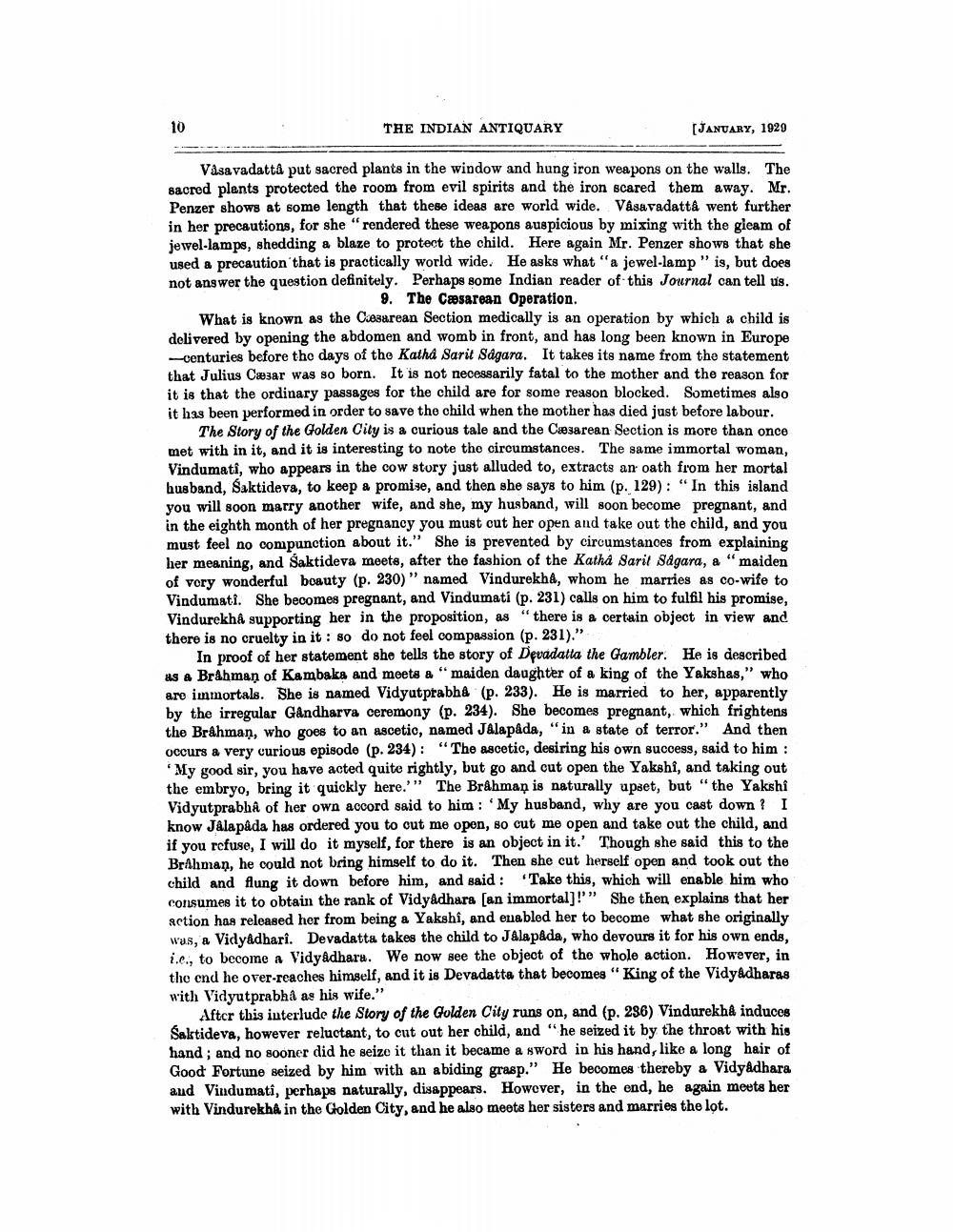________________
THE INDIAN ANTIQUARY
(JANUARY, 1929
Väsa vadatta put sacred plants in the window and hung iron weapons on the walls. The sacred plants protected the room from evil spirits and the iron scared them away. Mr. Penzer shows at some length that these ideas are world wide. Vasavadatt& went further in her precautions, for she "rendered these weapons auspicious by mixing with the gieam of jewel-lamps, shedding a blaze to protect the child. Here again Mr. Penzer shows that she used a precaution that is practically world wide. He asks what "a jewel-lamp " is, but does not answer the question definitely. Perhaps some Indian reader of this Journal can tell us.
9. The Cæsarean Operation. What is known as the Cusarean Section medically is an operation by which a child is delivered by opening the abdomen and womb in front, and has long been known in Europe -centuries before the days of the Katha Sarit Sågara. It takes its name from the statement that Julius Cæsar was so born. It is not necessarily fatal to the mother and the reason for it is that the ordinary passages for the child are for some reason blocked. Sometimes also it has been performed in order to save the child when the mother has died just before labour.
The Story of the Golden City is a curious tale and the Caesarean Section is more than once met with in it, and it is interesting to note the circumstances. The same immortal woman, Vindumati, who appears in the cow story just alluded to, extracts an oath from her mortal husband, Saktideva, to keep a promise, and then she says to him (p. 129): "In this island you will soon marry another wife, and she, my husband, will soon become pregnant, and in the eighth month of her pregnancy you must cut her open and take out the child, and you must feel no compunction about it.” She is prevented by circumstanoes from explaining her meaning, and Saktideva meets, after the fashion of the Katha Sarit Sagara, a "maiden of vory wonderful boauty (p. 230)" named Vindurekha, whom he marries as co-wife to Vindumati. She becomes pregnant, and Vindumati (p. 231) calls on him to fulfil his promise, Vindurekhâ supporting her in the proposition, as "there is a certain object in view and there is no cruelty in it: so do not feel compassion (p. 231)."
In proof of her statement she tells the story of Devadatta the Gambler. He is described as a Brahman of Kambaka and meets a "maiden daughter of a king of the Yakshas," who are immortals. She is named Vidyutprabha (p. 233). He is married to her, apparently by the irregular Gandharva ceremony (p. 234). She becomes pregnant, which frightens the Brahman, who goes to an ascetic, named Jalapáda, "in a state of terror." And then occurs a very curious episode (p. 234): "The ascetic, desiring his own sucoess, said to him :
My good sir, you have acted quite rightly, but go and cut open the Yakshi, and taking out the embryo, bring it quickly here.'” The Brâhman is naturally upset, but “the Yakshi Vidyutprabh& of her own accord said to him: 'My husband, why are you cast down? I know JAlapada has ordered you to cut me open, so cut me open and take out the child, and if you refuse, I will do it myself, for there is an object in it.' Though she said this to the Brahman, he could not bring himself to do it. Then she cut herself open and took out the child and Aung it down before him, and said: "Take this, which will enable him who consumes it to obtain the rank of Vidyadhara [an immortal]!” She then explains that her action has released her from being a Yakshi, and enabled her to become what she originally was, a Vidyadhari. Devadatta takes the child to Jalapada, who devours it for his own ends, i.c., to become a Vidyadhara. We now see the object of the whole action. However, in the end he over-reaches himself, and it is Devadatta that becomes "King of the Vidyadharas with Vidyutprabha as his wife."
After this interlude the Story of the Golden City runs on, and (p. 286) Vindurekha induces Saktideva, however reluctant, to cut out her child, and "he seized it by the throat with his hand, and no sooner did he seize it than it became a sword in his hand, like a long hair of Good Fortune seized by him with an abiding grasp." He becomes thereby a Vidyadhara aud Vindumati, perhaps naturally, disappears. However, in the end, he again meets her with Vindurekha in the Golden City, and he also meets her sisters and marries the lot.




